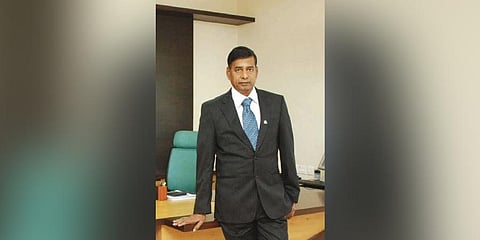

COIMBATORE/ERODE: As the Internet is flooded with stories of budding entrepreneurs attempting to spin yarns of eminence, a web search on textile industrialist KP Ramasamy will belie the legend. Unlike most of his peers, the 74-year-old Ramasamy prefers to stay away from media glare as he walks firmly into the Forbes India’s richest people list with a net worth of Rs 9,143 crore. The tags such as ‘farmer’s son’ and ‘college dropout’ have paled into irrelevance too.
A visit to his native village Kalliyampudur will, however, lay bare endearing anecdotes of his philanthropy stitched across decades. The hamlet has also tucked away threads of the $2.3 billion-worth industrialist’s humble beginnings as a poor farmer. “He did his primary education in a Christian school here. Then shifted to a school in Perundurai,” said P Venkatachalam, a power loom unit owner and a resident of Kalliyampudur. To help his family make ends meet, Ramasamy, being the eldest of three sons, dropped out of school in class 10 and began to help his parents Palanisamy and Sellammal, with farming.
After a year, he resumed his schooling and later completed a pre-university course from Sri Ramakrishna Mission Vidyalaya College of Arts and Science at Periyanaickenpalayam. Though he had aspired to become a doctor or agricultural engineer, he could not secure a seat.
He ended up in a BA course at a college in Sivakasi, only to drop out after six months and return to agriculture. He toiled in the fields to help pay for his two brothers’ education. Legends are made of humble beginnings. In 1971, he borrowed Rs 8,000 from a relative and started a power loom in the village. Business flourished and he set up a yarn unit in Coimbatore, and in 1997, he established a textile mill in Sathyamangalam. The ambitious youth set up hostels at the mill and was among the first to recruit women there.
Later, a touching encounter with a woman worker led him to the education sector. The worker, with tears welling up her eyes, told Ramasamy about how she longed to pursue higher studies. But she had to bury the dream as there was no educational institution in the region. This was a watershed moment. Ramasamy realised that the situation was the same for other workers in his mill. After deliberations with stakeholders, he decided to utilize the distance mode of education at universities. In 1998, his KPR Group of companies set up the Women Employees’ Educational Division.
Joining hands with Alagappa University, Annamalai University and Tamil Nadu Open University, the company has so far helped over 35,000 women pursue higher education. Some even went on to enter the government service. Besides, KPR Group has established arts and science colleges, an engineering college in Coimbatore, and an IAS academy that provides free coaching classes.
In the mid 1980s, Ramasamy found huge success in the cloth manufacturing business in Tiruppur city, recalled A Sakthivel, president of the Federation of Indian Export Organisations (FIEO). “Later, he set up a knitwear export unit and that too flourished. Then he brought the cotton, yarn, and garment businesses under a single system. At present, he has one of the largest vertically integrated textile processing establishments in the country,” he added.
Not just his textile empire, his educational institutions are also doing exceptional service to society, said Ravi Sam, a fellow industrialist and former president of the Southern India Mills’ Association (SIMA).
Efforts to reach out to him for an interview were gently rejected by his associates saying that KPR wants to stay away from media. “Over the past 20 years, KPR’s growth has been phenomenal. Through his hard work, he has now reached the number one position in the textile industry in Southern India. As fellow industrialists, we feel very proud of his achievement as he is the first person from the textile sector to enter the Forbes’ elite list,” G Arulmozhi, president of Open End Spinning Mills Association (OSMA), told TNIE.
As of today, the textile empire KPR Group also intertwines with business concerning sugar, power, automobiles and education.
Ramasamy’s dedication towards creating an eco-friendly environment has led to the company setting up several windmills in Tamil Nadu. He also runs a sugar plant in Karnataka. Manufacturing an impressive product range of textile varieties such as readymade knitted apparel, fabrics, compact, melange, carded, polyester and combed yarn, KPR Mill reaches customers across the world.
(With inputs from Saravanan M P @ Tiruppur, N Dhamotharan @ Coimbatore)